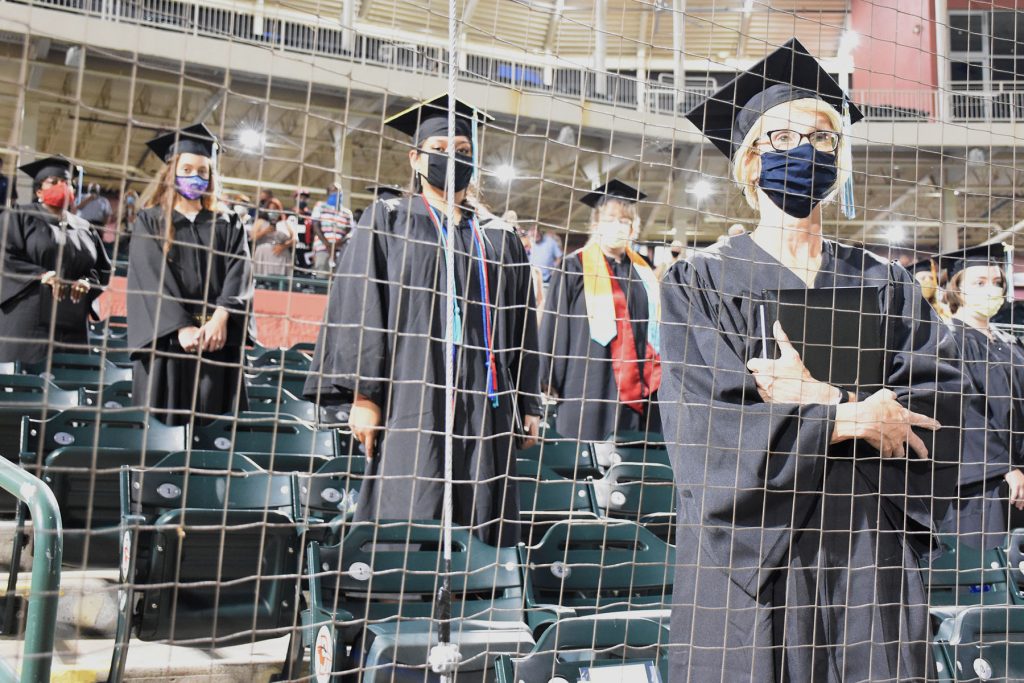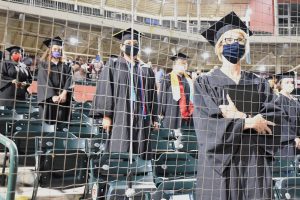
Wor-Wic Community College commencement ceremonies were recently held outdoors at the Arthur W. Perdue Stadium, in accordance with all state and CDC guidelines, including social distancing, timed arrivals and mask wearing. Graduates were limited to two guests and everyone needed a ticket to enter.
Dr. Ryan Messatzzia, associate professor of social science and outgoing faculty council chair, addressed the 2020 graduates. A licensed clinical social worker, he also teaches undergraduate and graduate courses for the social work department at Salisbury University. Messatzzia has worked at Wor-Wic for 12 years. Prior to becoming a faculty member, he was the academic and disabilities counselor for the college.
Messatzzia told those assembled that he was not the first choice for commencement speaker. He explained that the original plan was to have a prior year graduate give the speech on the occasion of the college’s 45th anniversary, but instead, he said, Dr. Ray Hoy, president of Wor-Wic, thought a faculty member, who went through many of the same stressors that students had to endure this spring, would have a more appropriate message.
Messatzzia told the graduates that 2020 was a rough year, listing several things that have happened that affected everyone so far this year. He compared 2020 to the amygdala – the part of the brain involved in the fight or flight response.
“The amygdala is the fear center of the brain,” he told the graduates. “When we’re faced with something really scary, it gets our body prepared to do one of two things — to fight back or to run away. And if we think about the year 2020, 2020 has been full of fear, anxiety, stress and a lot of negative emotion.”
Messatzzia told the crowd that what a lot of people don’t realize about the amygdala is that it isn’t just involved in producing feelings of fear. It also is involved in housing memories. He said that because it’s associated with fear, it houses fearful, negative memories, “but what a lot of people don’t know, and what science is increasingly showing, is that the amygdala also houses positive memories — positive experiences that we’ve lived through.”
He said that this was important for him to remember, because 2020 has been a scary year and the spring term was very stressful, but even within all that chaos, there have been positive memories that he will cherish for the rest of his life, such as the student services employees who were working remotely from home but who still managed to reach out to literally hundreds of students during the spring term to check not only on their academic status but also on their overall health and well-being, and who also organized drive-thru food pantries to provide assistance to those who needed a little extra help during this difficult time.
“But more than anything, when I think about the spring semester,” Messatzzia said, “I’ll think about you guys, the students.” Messatzzia said he would remember the nearly 500 students who made the dean’s list during the most unprecedented term in the college’s history, the allied health, education and chemical dependency counseling students who, in the middle of a pandemic, returned to their field placements and continued to provide services to their patients, students and clients because they have a dedication to their future professions, and how incredibly proud of them he was that they were out there representing Wor-Wic in the community. “I’ll remember students who shared with me news of children being born, engagements and all kinds of triumphs big and small,” he told the crowd. “I’ll think of all of us as a college — administration, students, faculty — working together during this really difficult time to make it through.
“And when I think about this theme that kind of underlies all of these memories for me, that theme is connection. That what gets us through difficult times is each other. It’s the support, caring and encouragement of others that helps us persevere, to persist. And that’s the important thing I think to keep in mind about this year. That it’s been stressful, it’s been chaotic, but we’re all in this together. That when your amygdala is crying out, ‘danger, danger, danger,’ what I hope you’re able to do is to remember the people that have been there to support you — to remember the positive memories of this time.”
He concluded his remarks by saying, “So, I wish you success in your careers after graduation, but I hope you leave here remembering that the amygdala is not just for fear, it’s for positive things too. And as the year trudges along and the fear accumulates, as inevitably it will, that you remember the positive memories of this period of time. That you actively seek out the positive in the world around you. And not just that, but that you leave here tonight with open minds, open hearts and open eyes seeking to create positive memories in other people’s amygdalas.”
Russell W. Blake of Pocomoke City, chairperson of Wor-Wic’s board of trustees, introduced Messatzzia and other speakers that included Dr. Ray Hoy, president, Dr. Kristin L. Mallory, vice president for academic affairs, Dr. Bryan Newton, vice president for enrollment management and student services, Pastor Christopher Lightfoot, and Gavin Stephens, student government association president, along with other members of the board of trustees, representatives from the Wicomico County Council and the Worcester County Commissioners, as well as members of the Maryland General Assembly, who were in attendance.
Addressing his fellow graduates, Stephens shared his personal experiences of how Wor-Wic changed his life.
“In between where you start and where you end, there is always a journey,” Stephens said. “My journey started out comfortable. I was well taken care of growing up, yet I still feel like I needed to stand out in order to fit in.” Stephens told the crowd that desire led him to being incarcerated for more than four years, and that making that mistake and surviving the consequences, led him to a sense of peace. “On your journey, there will be critics, there will be naysayers and doubters,” he said. “Don’t worry about them. We have our own mistakes to learn from as well as the mistakes of others.” Stephens said that he educated himself a lot in prison, yet knew he needed more education. “Wor-Wic was the answer. Wor-Wic gave me a chance to prove that I was bigger than my past, and I’m sure that it gave you guys a chance … as well,” he said.
Stephens told the graduates that all of his experiences at Wor-Wic helped him become a better listener and a better leader, which helped him move past his mistakes.
“I found during my time at Wor-Wic that consistency and discipline are key to achieving goals,” Stephens told the crowd. “Discipline is something you’ve already proven by the degree that you’re obtaining today. But, don’t lose the discipline now.” After all, he told the graduates, it was discipline that made us get our homework done, show up for that early class and work on a project when we were invited to do something much more fun. “Discipline will serve you well beyond Wor-Wic.
“We must be consistent. When people get to know us, we want them to trust that they really know us. Being consistent builds trust and it builds respect. If you’re not consistent in your efforts, your attitudes and your values, that job offer might slip away, family and friends, they may become distant and the health of your body could even deteriorate. It was discipline and consistency that helped me move along with my success at Wor-Wic.”
Stephens told those assembled that he chose Wor-Wic to help him achieve his dreams and succeed in spite of his mistakes, urging the crowd not to be afraid to “share your story with somebody. It could be the key that unlocks somebody else’s prison.”
In conclusion, Stephens told the graduates, “The best is yet to come. However, you still may make wrong turns, mess up and make some mistakes. But, if you’re committed to learning from your mistakes and becoming a better version of yourself every day, then you will be unstoppable.”
After receiving his business transfer associate degree from Wor-Wic, Stephens plans to pursue a bachelor’s degree at Salisbury University and hopes to own and manage his own business one day.
Criminal justice was the most popular major among members of the graduating class. One of the graduates receiving an associate degree in criminal justice, Daniel Downes of Snow Hill, used his GI Bill benefits to earn his degree.
A dean’s list student, Downes said he wanted to better himself for his child and their future. A former career firefighter and emergency medical technician, he now works as a regional coordinator for a private emergency management company that creates preparedness plans for hospitals, nursing homes, long-term care facilities and health departments. Due to the pandemic, he has been extra busy with work and it has been a challenge to get everything done — working full time, studying and taking care of his 5-year-old son. COVID-19 has put his bachelor degree plans on hold temporarily, but he plans to continue his education and says that he enjoys his current job in emergency management and would like to move up and see where he can go from there at either the state or federal level.
Following criminal justice, general studies was the second most popular major. One of the general studies program graduates, Ian Nibblett of Eden, stopped taking high school classes after his sophomore year and enrolled at Wor-Wic. This year’s youngest graduate, Nibblett said he came to Wor-Wic because of the affordability and simplicity of getting enrolled. “By starting at Wor-Wic and transferring to a four-year university, versus starting and finishing at a four-year university, I saved a great amount of money in tuition. My experience was great, I met a lot of people and learned new things — life skills as well as academic skills. I think that Wor-Wic has helped shape me into the individual I am today and prepared me well for the future. Wor-Wic made getting a degree challenging but doable.”
A dean’s list student with a 3.59 grade point average, Nibblett is a member of the Alpha Nu Omicron chapter of Phi Theta Kappa, an international honor society for community college students. After earning his associate degree in general studies at the age of 18, he plans to transfer to Salisbury University to pursue a bachelor’s degree in business management. His career goal is to one day own a business, possibly in the field of security or construction.
Other graduates received degrees or certificates in accounting, business, chemical dependency counseling, computer studies, education, emergency medical services, hotel-motel-restaurant management, nursing, occupational therapy assistant, office technology, physical therapist assistant, radiologic technology and science.
The majority of the graduates were from Salisbury or other parts of Wicomico County, followed by Worcester and then Somerset counties. Graduates were also from Dorchester, Caroline, Kent, Queen Anne’s, Talbot and other counties in Maryland, as well as from nearby states.
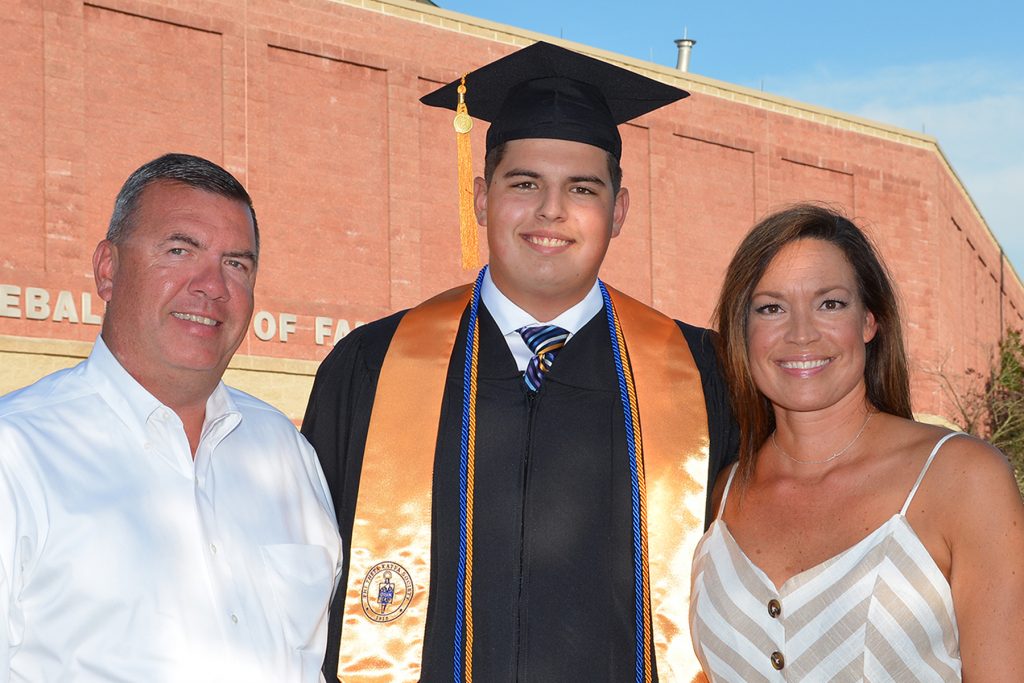
WICOMICO GRADUATE. Ian Nibblett of Eden, shown with his parents, Scott and Nancy, received his associate degree in general studies at Wor-Wic Community College commencement exercises at the Arthur W. Perdue Stadium.
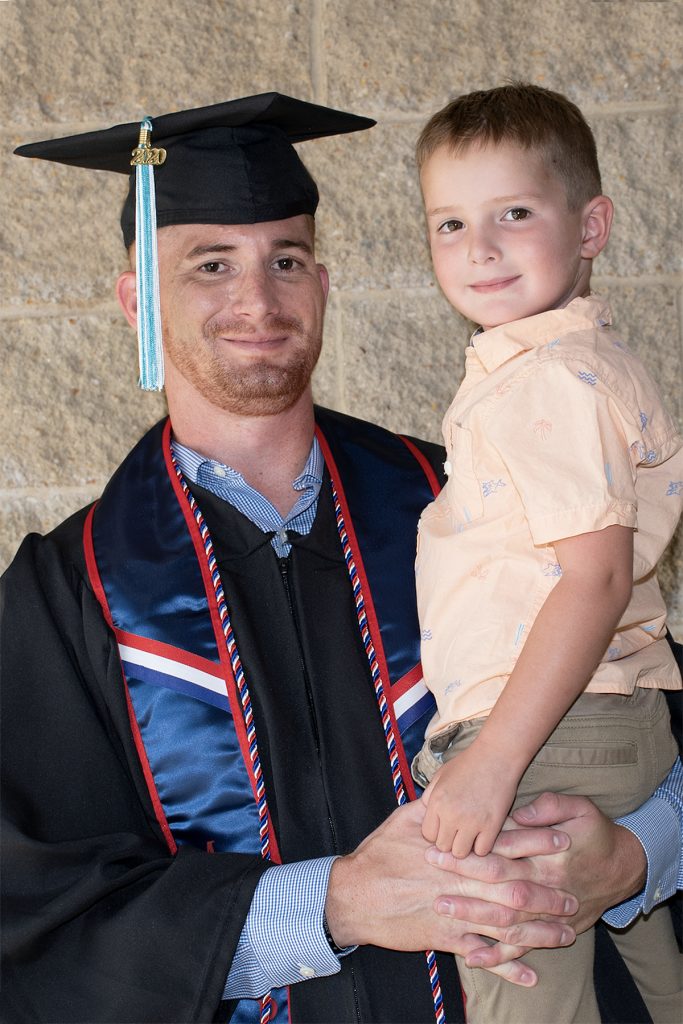
WORCESTER GRADUATE. Daniel Downes of Snow Hill, proudly holds his son, Grayson, 5, prior to receiving his associate degree at Wor-Wic Community College commencement exercises at the Arthur W. Perdue Stadium.
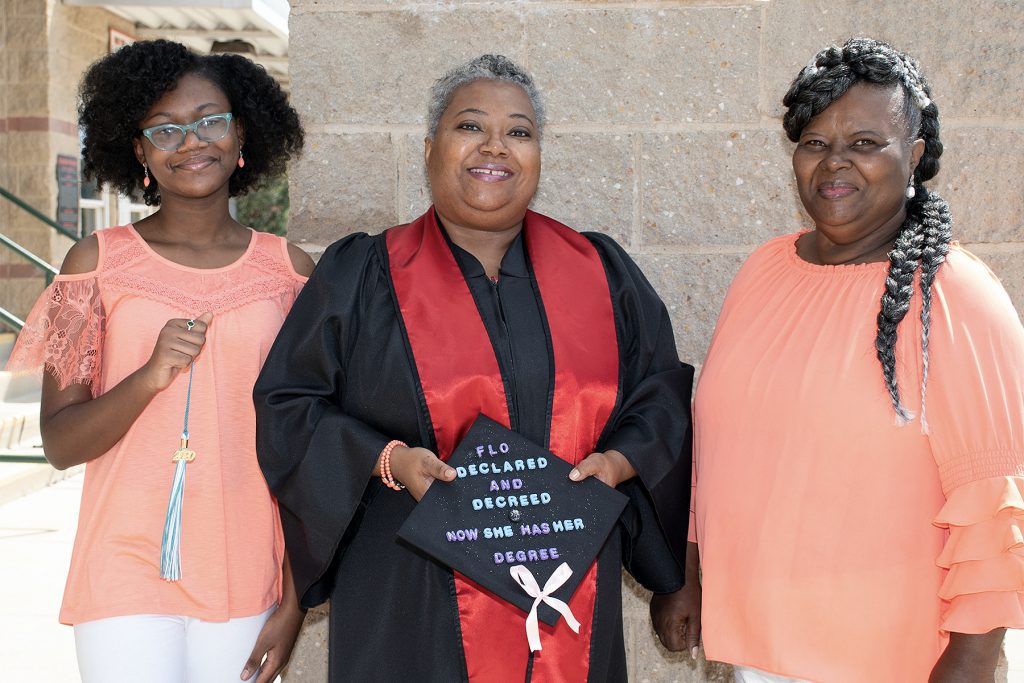
SOMERSET GRADUATE. Florence Hankerson of Eden, one of the graduates from Somerset County who received her associate degree at Wor-Wic Community College commencement exercises at the Arthur W. Perdue Stadium, is shown with her daughter, Jalayna, 13, and her mother, Phyllis E. Hankerson.


